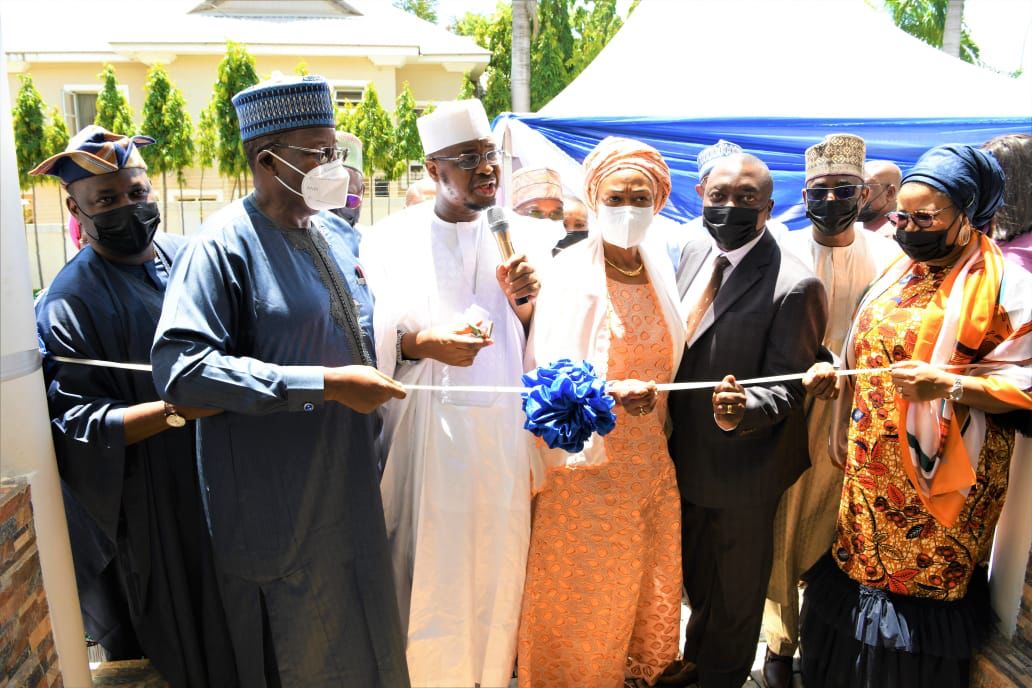Telecom
Cybersecurity: NCC Inaugurates Incident Response Facility

The Nigerian Communications Commission (NCC) has inaugurated an incidence response facility aimed at addressing incidences of cybercrimes, protecting telecoms infrastructure and encouraging increased participation in nation’s digital economy.

L-R: Honourable Akeem Adeniyi Adeyemi, Chairman House Committee on Telecommunications; Prof. I.G Danbatta, Executive Vice Chairman/CEO, Nigerian Communications Commission (NCC); Prof. Isa Ali Ibrahim (Pantami), Honourable Minister of Communications and Digital Economy; Mrs. Oluremi Tinubu, Chairman, Senate Committee on Communications; Brigadier General, Samad Akesode, Representative of the National Security Adviser, Major General Babagana Monguno (Rtd); Kashifu Abdullahi Inuwa, Director General, National Information and Technology Development Agency (NITDA) and Dr. Abinbola Alale, Director General, NICOMSAT.
The NCC Center for Computer Security Incident Response is the Commission’s industry-specific intervention, whose objectives are aligned to the National Cybersecurity Policy and Strategy (NCPS) published by the Office of the National Security Adviser (ONSA). The NCPS requires each sector to establish a computer incident response team provides requisite services to the stakeholders and players within each sector.
The overall mandate of the NCC-CSIRT is to ensure continuous improvement of processes and communication frameworks to guarantee secure and collaborative exchange of timely information while responding to cyber threats within the sector.
Speaking during the commissioning of the project in Abuja at the weekend, the Prof. Isa Ali Ibrahim Pantami, minister of Communications and Digital Economy, described the Center as a strategic step in boosting cybersecurity in Nigeria and commended the Board of NCC and Danbatta-led Management of the Commission for ensuring successful implementation of the project.
Pantami noted that the commissioning of the Facility marks an important milestone in the telecommunications industry in Nigeria, and described it as a significant measure in the support of national efforts at protecting the information and communication technology infrastructure in the country.
“The creation of the Center is in line with the provisions of the National Cybersecurity Policy and Strategy (NCPS) document published by the Office of the National Security Adviser (ONSA), which was recently updated and launched by President Muhammadu Buhari in February 2021. In keeping with the principles enshrined in the policy, each sector is expected to establish a sectoral Computer Incident Response Team (CSIRT) that provides requisite services to the constituents within that sector,” the Minister said.
In his address at the event, the Prof. Umar Danbatta, executive vice chairman of NCC, stated that, considering the increasing growth in Internet usage, especially as a consequence of the outbreak of the pandemic, the Commission observed a rise in cyber incidents and criminal activities.
“Thus, the Commission recognises that with the borderless nature and pervasiveness of these incidences, relentless and concerted attention is required to protect Internet users as well as the Critical National Information Infrastructure and ensure they are resilient”, Danbatta said.
The EVC emphasised that the NCC-CSIRT has been structured to operate within the framework of the NCPS and the National Digital Economy Policy and Strategy (NDEPS) to assist the Nigerian communications sector with the management and coordination of cyber security incidents and threats. He noted that the CSIRT is established as a proactive step towards building trust, and safety needed for growing the digital economy.
“The CSIRT’s services will commence with four main thrusts, namely: monitoring, incident management, communication, and alert and warning. The devices for handling these four areas will be scaled up and expanded as the Centre’s operations grow in order to enhance the digital economy and ensure it yields great dividends to the Nigerian citizens,” Danbatta said.
Danbatta explained that the key mandates of the CSIRT, which will be achieved through collaborative effort with relevant stakeholders, organisations and agencies, include assisting the sector in the defence and response to major cyber threats and attacks targeted at the members within the sector, providing information, technical as well as policy advisories to the constituency to strengthen the defensive and response capabilities to cyber threats. The Centre is also to liaise with other sectoral CSIRTs as well as local and international security frameworks to protect the communications sector and the general wellbeing of the Nigerian people.
Other mandates of the NCC-CSIRT, highlighted by Danbatta, are to provide guidance and direction for the constituents in dealing with issues relating to the security of critical infrastructure in their possession; and to periodically assess, review and collate the threat landscape, risks, and opportunities affecting the communications sector and provide advice to relevant stakeholders.
Meanwhile, the National Security Adviser (NSA), Major General Babagana Monguno (Retd), who was represented at the event by Brigadier General, Samad Akesode, has also acknowledged the establishment of NCC CSIRT as a clear demonstration of the Commission’s resolve to join hands with the Federal Government in mitigating any risk that will emanate as the country embraces advanced technology to facilitate digital transformation in the country.
According to Monguno, by establishing the CSIRT, the NCC has taken a step that could only be described as impeccable and timely, and in conformity with the highest standards and international best practise which aligns with the requirement of the Cybercrimes (Prohibition, Prevention etc) Act, 2015.”
Leadership of the National Assembly, including the Chairman, Senate Committee on Communications, Senator Oluremi Tinubu and the Chairman, Committee on Telecommunications in the House of Representatives, Akeem Adeyemi also profoundly applauded the Danbatta-led NCC for taking a leading position for sectoral implementation of the NCPS and improving security of cyber space for all.
Others, who delivered goodwill messages, commended the Commission, and spoke about the significance of the CSIRT project to national economy and national security, include the Permanent Secretary, Federal Minustry of Communications and Digital Economy, Mr. Bitrus Nabasu as well as other heads of agencies in the Ministry.
Telecom
NCC, REA Move to Power Telecoms with Renewable Energy

Nigerian Communications Commission (NCC) and Rural Electrification Agency (REA) have teamed up to develop an initiative that will reduce the $350 million annual spending on diesel by telecom operators in Nigeria.

According to a press statement by Nnenna Ukoha, acting had of Public Affairs, NCC, this collaboration will focus on deploying renewable energy solutions to support telecom infrastructure, particularly in rural and underserved areas.
To that end, the two agencies have inaugurated what they called NCC–REA Collaboration Committee, aimed at deploying renewable energy solutions to power telecom infrastructure across the country.
According to the State of Africa’s Infrastructure Report 2025 by the Africa Finance Corporation, telecom operators in Nigeria consume more than 40 million litres of diesel every month, costing them over $350 million annually.
The statement read, “The Nigerian Communications Commission has formally inaugurated the NCC–REA Collaboration Committee, marking a pivotal step towards advancing Nigeria’s digital and energy inclusion objectives by developing modalities for the deployment of renewable energy to support telecom infrastructure in Nigeria.”
The inauguration ceremony, held on Friday, at the NCC Headquarters in Abuja, was presided over by Dr Aminu Maida, executive vice chairman and chief executive officer, NCC.
Maida was joined by Abba Aliyu, managing director of the REA, along with senior executives and committee members from both organisations.
Speaking at the event, Maida described the collaboration as a timely and strategic alignment of national priorities.
He noted that bridging the connectivity and power gaps in rural areas remains critical for Nigeria’s growth and development.
He highlighted that the demand for digital services and connected communities creates an opportunity for renewable energy to play a crucial role.
Maida further emphasised that the partnership goes beyond infrastructure; it is aimed at driving inclusion, reducing inequalities, and fostering shared prosperity.
“Whether it is powering a base station or enabling a child to access digital learning, this partnership has the potential to transform realities and bring opportunity closer to the people.
“This initiative is about more than infrastructure, it is about driving inclusion, bridging inequalities and creating the conditions for shared prosperity,” he was quoted in the statement.
He also noted that the initiative aligns with President Bola Tinubu’s Renewed Hope Agenda, which aims to ensure no community is left behind in Nigeria’s energy and digital transformation.
Aliyu, representing REA, expressed confidence in the transformative potential of the collaboration.
“This partnership will unlock sustainable development opportunities for millions of Nigerians, especially those in areas lacking traditional infrastructure,” he said.
He further emphasised that the collaboration would address both energy and connectivity gaps, benefiting those who are currently underserved.
The newly established NCC-REA Collaboration Committee will work to co-develop and implement integrated solutions that leverage renewable energy to power telecom sites.
The statement noted that the committee will also focus on sharing geospatial data to improve planning, aligning funding frameworks, and tracking the socio-economic impact of the project through clear performance indicators.
Telecom
NCC Approves MTN, 9Mobile Roaming Collaboration Deal

MTN Nigeria Communications Plc has announced the execution of a national roaming agreement with Emerging Markets Telecommunications Services Limited (9Mobile), a move that signals a major milestone in Nigeria’s telecommunications landscape.

The Nigerian Communications Commission (NCC), the industry’s regulatory authority, has approved the three-year deal, which allows 9Mobile subscribers to roam seamlessly on MTN Nigeria’s extensive network infrastructure across the country.
The agreement, effective immediately, will significantly enhance connectivity and user experience for 9Mobile customers, particularly in areas where its network coverage is limited.
By leveraging MTN’s expansive infrastructure, 9Mobile can now offer improved service reach and reliability, without duplicating capital-intensive investments in network deployment.
In a notice to the Nigerian Exchange Limited and the investing public, MTN Nigeria described the arrangement as a strategic collaboration that underscores its leadership in fostering innovation, industry cooperation, and operational efficiency.
The company emphasized that the initiative aligns with the NCC’s broader objective of promoting infrastructure sharing to improve telecommunications services nationwide.
“This agreement represents a significant step in our commitment to driving industry collaboration, improving customer experience, and supporting the NCC’s vision of a fully connected Nigeria,” said Karl Toriola, chief executive officer, MTN Nigeria.
“Delivering the scale required for telecommunications services in Nigeria requires strong collaboration between the private sector, public sector, and long-term investors. This agreement demonstrates what we can achieve when we collaborate, and we are delighted to announce it today after months of groundwork.”The national roaming deal enables subscribers from 9Mobile to access voice and data services through MTN’s network in areas where the former lacks adequate coverage.
This marks the first such large-scale, cross-network roaming arrangement between two major operators in Nigeria, setting a precedent for future cooperative efforts in the telecom industry.
MTN Nigeria highlighted that the agreement contributes to more effective use of telecommunications resources, reduces infrastructure duplication, and accelerates the expansion of mobile broadband access across underserved regions.
It also supports both operators’ sustainability objectives by maximizing existing investments and reducing the environmental impact of deploying overlapping network facilities.
“This strategic collaboration is yet another first in the country by MTN Nigeria and marks a significant milestone for the sustainability of the telecommunications industry,” the company stated.
“By enabling national roaming, MTN Nigeria is contributing to a more effective use of telecommunications resources and accelerating efforts to expand connectivity across the country.”
The agreement is expected to benefit not just subscribers and operators but also regulators and investors who have consistently advocated for policies that promote shared infrastructure and efficient capital utilization in Nigeria’s digital economy.
Uto Ukpanah, company secretary, MTN Nigeria, affirmed the company’s ongoing dedication to initiatives that create shared value.
“MTN remains committed to fostering innovation and partnerships that create sustainable value for all stakeholders while promoting digital and financial inclusion nationwide,” she noted.
With the successful rollout of this agreement, the telecoms industry is expected to see improved service delivery and expanded access to quality mobile services, especially in rural and semi-urban communities. The collaboration sets a benchmark for future inter-operator partnerships and reinforces the importance of regulatory support in advancing national connectivity goals.
Telecom
Don’t Visit Telecom Centers for Now — ALTON Warns of SIM Service Downtime

Association of Licensed Telecommunications Operators of Nigeria (ALTON) has announced a temporary disruption in SIM-related services across all mobile networks in the country.

The disruption, according to a statement on Wednesday, follows a directive from the National Identity Management Commission (NIMC), mandating mobile network operators (MNOs) to migrate to a new identity verification platform.
ALTON said the transition had triggered unforeseen technical challenges, affecting services such as SIM registration, replacement, and mobile number portability.
“While the new platform is intended to enhance the integrity and efficiency of identity management in Nigeria, unfortunately, the transition has temporarily impacted service delivery,” the association stated.
It added that MNOs would not be able to support SIM swaps, new activations, and related services until the issues are resolved.
ALTON noted that its members are working closely with the Nigerian Communications Commission (NCC), NIMC, and other stakeholders to restore normalcy.
The association appealed for public understanding and urged subscribers to delay visits to service centers for SIM-related matters.
“We sincerely apologise for the inconvenience and will continue to provide timely updates,” the statement read.
ALTON reaffirmed its commitment to delivering secure and quality telecommunications services to Nigerians.

 E-Financial3 days ago
E-Financial3 days agoAccess ARM Pensions Advocates Ways to Boost Civil Servants’ Retirement

 Telecom3 days ago
Telecom3 days agoMTN Nigeria Launches “Mega Billion Promo” to Reward Customer Loyalty and Drive Financial Inclusion

 E-Business3 days ago
E-Business3 days agoFirm Warns as Social Media Scams Put Users’ Data at Risk

 Telecom2 days ago
Telecom2 days agoAVEVA Highlights Climate Impact Gains in 2024 Sustainability Report

 General News2 days ago
General News2 days agoAfCFTA Opens Opportunity for Logistics Sector

 E-Business3 days ago
E-Business3 days agoNigeria Ranks 3rd in Africa for Ransomware Threats –INTERPOL

 Telecom2 days ago
Telecom2 days agoALTON Explains SIM-related Services Disruption Across Mobile Networks

 General News3 days ago
General News3 days agoNELFund Warns Students Against Fake Loan Portal

























